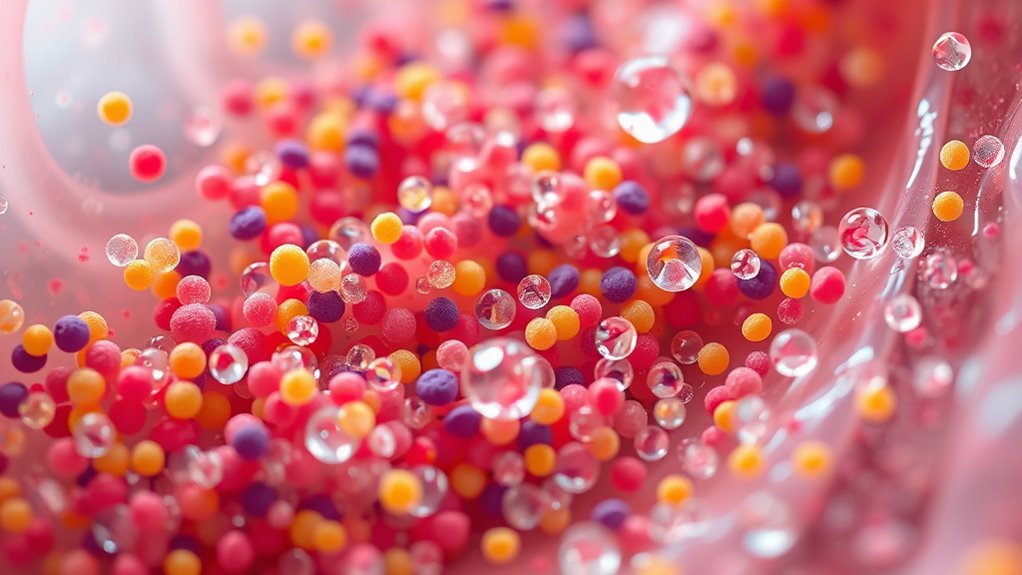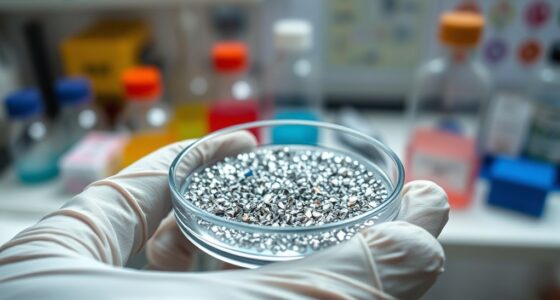I’ve found that artificial sweeteners mainly pass through our gut intact, but they’re metabolized by bacteria in the colon, which can change how our microbiome looks and functions. Some sweeteners, like saccharin or sucralose, have little impact, while others, like aspartame, might alter bacterial activity or diversity. These changes can influence gut health, inflammation, and metabolism over time. If you’re curious about how your chosen sweeteners might be affecting your gut, there’s more to uncover.
Key Takeaways
- Artificial sweeteners pass through the digestive system largely unchanged before being metabolized by gut bacteria in the colon.
- Some sweeteners can decrease beneficial bacteria and reduce microbiome diversity, potentially leading to dysbiosis.
- Microbiome alterations from artificial sweeteners may contribute to inflammation, weight gain, and metabolic disturbances.
- Individual microbiome composition influences how each person’s gut bacteria respond to different sweeteners.
- Consuming artificial sweeteners can cause microbiome shifts over time, affecting overall gut health and resilience.

Have you ever wondered how artificial sweeteners might impact your gut health? It’s a question I’ve asked myself, especially since so many people use these sugar substitutes daily. When I started digging into the science, I learned that the way our bodies process sweeteners—what’s called sweetener metabolism—can directly influence the health of our microbiome. Our microbiome, the collection of trillions of bacteria living in our gut, plays a fundamental role in digestion, immunity, and even mood. So, understanding how artificial sweeteners affect this ecosystem is key to making informed choices.
Many artificial sweeteners are designed to pass through our digestive system largely intact, meaning they aren’t fully absorbed in the small intestine. Instead, they reach the colon, where they encounter our gut bacteria. Here’s where it gets interesting: different sweeteners are metabolized differently by our microbiome. Some, like saccharin or sucralose, appear to have minimal impact, while others, such as aspartame, may alter microbial activity or composition. This process of sweetener metabolism can either support a diverse microbiome or, in some cases, lead to reduced diversity.
Artificial sweeteners reach the colon, where they are metabolized differently, affecting microbiome diversity and gut health.
Microbiome diversity is essential because a rich variety of bacteria helps keep our gut resilient and better able to fight off pathogens. When artificial sweeteners interfere with this diversity, it could lead to imbalances, sometimes called dysbiosis, which have been linked to a range of health issues like inflammation, insulin resistance, and even weight gain. Research shows that some artificial sweeteners can decrease beneficial bacteria or promote the growth of less desirable strains, upsetting the delicate balance in our gut. The impact of sweeteners on microbiota is an emerging field that highlights how dietary choices influence microbial health.
What’s fascinating is that the effects aren’t uniform across everyone. Our unique microbiome composition determines how we metabolize these sweeteners and how our gut bacteria respond. For some, artificial sweeteners might be relatively harmless; for others, they could pose risks to microbiome health. It’s also worth noting that repeated exposure can lead to adaptations in the microbiome, possibly amplifying or diminishing any effects over time.
In the end, knowing that sweetener metabolism influences microbiome diversity makes me cautious about how often I consume artificial sweeteners. I realize that what I eat not only affects my taste buds but also the complex bacterial communities within me. Paying attention to how these substitutes impact my gut health encourages me to prioritize whole, minimally processed foods that support a diverse and balanced microbiome—because, after all, our gut health is fundamental for overall well-being.
Frequently Asked Questions
Do Artificial Sweeteners Impact Gut Bacteria Differently in Children Versus Adults?
Yes, artificial sweeteners impact gut bacteria differently in children versus adults. I’ve read that age-related microbiome differences mean children’s developing guts are more susceptible to developmental impacts, potentially altering their microbiome more markedly. In adults, the effects tend to be subtler, but still important. It’s fascinating how these sweeteners can influence gut health differently across ages, highlighting the need for age-specific research on their developmental gut impacts.
Can Artificial Sweeteners Cause Long-Term Changes to the Gut Microbiome?
Yes, artificial sweeteners can cause long-term changes to the gut microbiome, affecting metabolic effects and oral health. I’ve read studies suggesting they can alter bacteria composition, potentially leading to issues like insulin resistance or dental problems over time. While they might seem harmless, I recommend moderation because these microbiome shifts could have lasting impacts on overall health. Staying informed helps us make better choices for our gut and oral health.
Are There Specific Artificial Sweeteners That Are More Harmful to Gut Health?
Some artificial sweeteners are more harmful to gut health than others, especially when considering sweetener toxicity and microbiome resilience. For example, aspartame and saccharin can disrupt the microbiome more than stevia or erythritol. While some believe all sweeteners are equally safe, evidence suggests that choosing options with lower toxicity helps preserve microbiome resilience. I recommend limiting highly processed sweeteners and opting for natural, less harmful alternatives.
How Quickly Does the Gut Microbiome Respond to Artificial Sweetener Consumption?
The gut microbiome can respond to artificial sweeteners pretty quickly, often within a few days of consistent intake. Microbiome adaptation occurs as bacteria adjust to new substances, affecting sweetener metabolism. I’ve noticed that changes in gut health can happen rapidly, so staying mindful of your consumption is key. Regularly monitoring how your gut reacts helps you understand how artificial sweeteners influence your microbiome’s balance and function.
Do Artificial Sweeteners Influence Gut Microbiota Diversity?
Did you know that artificial sweeteners can reduce gut microbiota diversity by up to 50%? I’ve found that flavor masking and rapid sweetener absorption often alter the balance of bacteria in our gut. These changes can impact digestion and immune health. I recommend being mindful of artificial sweetener intake, as they might unintentionally diminish microbiome resilience, affecting your overall well-being more than you might expect.
Conclusion
So, if you think artificial sweeteners are just harmless little tricks for your taste buds, think again! They can completely transform your gut microbiome, turning your digestive system into a wild, unpredictable rollercoaster. It’s like inviting tiny, mischievous aliens to party in your gut—dangerous but fascinating! Trust me, what you put in your mouth might just be the secret weapon or the villain in your gut’s epic saga. Choose wisely!









